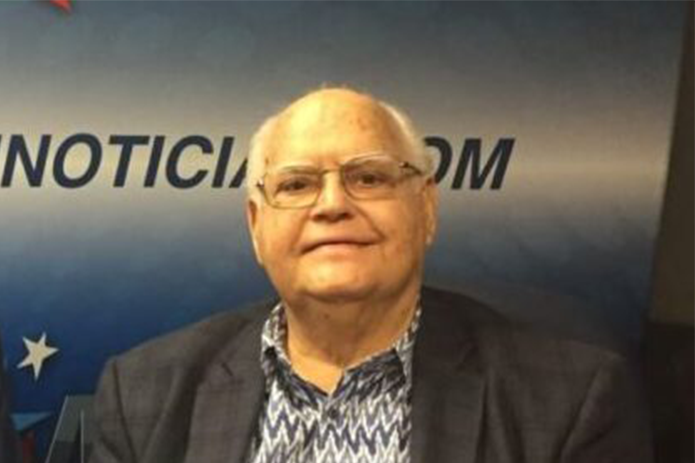MIAMI, FL – October 10, 2019 – (HISPANICIZE WIRE) – Businessman and community activist Julio Balsera passed away last night. He was 80 years old.
Balsera was born in Havana on April 12, 1939, to Spanish parents who emigrated to Cuba in the early 1900s. He fled his native Cuba in 1960 when he was discovered conspiring against the Castro regime. He escaped by hiding in the kitchen cabinets of a cargo ship bound for Caracas, Venezuela from Havana. In 1963 he arrived in Miami, where he raised his family and actively worked to improve his community until the day he died.
Balsera’s professional life in South Florida started in the late ’60s, a time in which the population of recently arrived Cuban families with young children was rising. Many new exiles worked two to three jobs to survive and did not qualify for free public school transportation. Balsera recognized this need and launched the first private school bus company in Miami’s history in 1967 – J. Balsera School Bus Service, Inc. The business began with a station wagon that was adapted with wooden benches and went on to ultimately serve hundreds of thousands of children across South Florida over the next 40 years.
Balsera’s early business years coincided with the time when Miami’s Cuban American community was beginning to position itself as an influential force in local politics. Balsera capitalized on his direct contact with the Cuban families he served to engage them with aspiring candidates and politicians. He was known to say, “The parents of the children that I transported didn’t know who the candidates for public office were, but they knew me and trusted me when I would recommend who to vote for.” His fleet would later be used for many political campaigns and civic organizations to mobilize voters.
In 1977, as the school transportation industry grew and developed, Balsera created the Association of Independent Bus Owners (Asociación de Transportistas Independientes) to consolidate resources and defend transportation companies against an evolving regulatory landscape that threatened them. Over the next decade, he would come to play an active role in the campaigns of Mayors Maurice Ferré and Steve Clark, Commissioner Manolo Reboso, and Congressmen Claude Pepper and Dante Fascell.
Balsera had a deep commitment to democracy in Cuba and put forward his personal and professional resources to advance that cause. During the Mariel boatlift crisis in 1980, when tens of thousands of Cubans were landing on Florida’s shores with no means of transportation, Balsera donated his services to help them. For months, after his bus fleet finished the afternoon school runs, Balsera and his team would drive down to Key West to pick up recently arrived Cubans and drive them up to Miami overnight. Balsera would regularly make his bus fleet available for Cuban pro-democracy events. He was actively involved with the Cuban American National Foundation and was a founding member.
With the help of his wife, Esther, Balsera was responsible for the transportation services and logistics for many of Miami’s most important events during the ‘70s, ‘80s, and ‘90s, including the visit of Pope John Paul II, Super Bowls, the Miss Universe pageant and major parades like King Orange Bowl, Martin Luther King Day, and Three Kings Day.
In 1983, The Miami Herald recognized Balsera’s activism by publishing a story with a headline saying, “If Flagami were a city, Julio Balsera would be its mayor.” Flagami is the neighborhood where Balsera lived until the day he passed.
Balsera was highly committed to public education and was president of the PTA for Henry M. Flagler Elementary, the school that his three children attended and from where he launched his business. The first PTA meeting in Miami Dade’s history with a Spanish language translator was conducted by him in 1979. As PTA President, Balsera raised the funds to air condition the school and establish its first computer lab at a time when public resources weren’t available. He later became countywide vice-president of the PTA.
Balsera was also actively involved with ASPIRA of Florida, an organization that began by offering programs for at risk youth that were susceptible to dropping out of school or joining gangs. Every year Balsera would donate his bus fleet for ASPIRA to send their kids on field trips.
After 40 years of service, Balsera sold his company and dedicated his retirement to civic involvement. Known for holding politicians accountable for their broken promises, Balsera organized groups in 2007 and 2008 that traveled to Tallahassee to confront ex Governor Charlie Crist on his campaign pledge that taxes would “drop like a rock.”
In 2011, Balsera led the Hispanic effort to recall then Miami-Dade Mayor Carlos Alvarez for having increased taxes and staff salaries in the midst of an economic crisis. Working from an office in Little Havana alongside a group of volunteers, Balsera and his wife collected over 100,000 signatures that called for a referendum that resulted in Mayor Alvarez being recalled.
Balsera passed away peacefully surrounded by his family after a 13-month battle with leukemia. He is survived by his wife, his children, Juliette, Freddy, and Esther Maria, and seven grandchildren. Funeral services will take place in Caballero Rivero Funeral Home Westchester, 8200 Bird Road, at 6pm on Friday, October 11. There will be a mass at St. Dominic Catholic Church, 5909 NW 7th Street, on Saturday, October 12, at 10am.
Media may click on this link for photos from Balsera’s public life.


